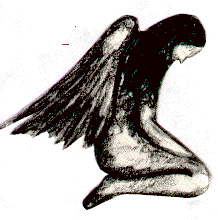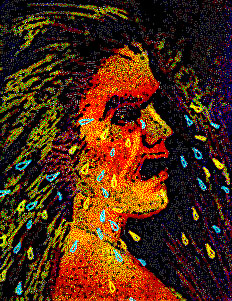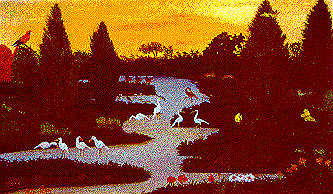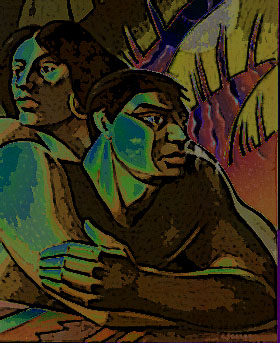Juliet Paez:
Gabriel Garcia Marquez/Pablo Escobar
The beautiful country of Colombia, known for its emeralds, the myth of El Dorado, its tropical landscapes, and its capital nettled in the Andean peaks, has produced two of most well known South Americans of the Twentieth Century. These men have come to represent the dichotomy of the Latin American character and both have made the world take notice of a place that until recently was known only for producing "the richest coffee in the world", and the stereotype of Juan Valdez.
Gabriel Garcia Marquez, Nobel Prize laureate, socialist, storyteller, representative of the lyrical Colombian soul. A man who has stood steadfast by his beliefs and has lived most of his life exiled from the country of his birth and which he poetically describes in his books. His writings tell of a people, place, and time that have never existed yet are as real as the cruelest and sweetest reality. The magic realism that permeates his works permeates the lives and the psyche of the Colombian people as well.
Pablo Escobar Gaviria, narcotics kingpin, terrorist, killer, Boss, Godfather, representative of the violence that is so much a part of the history of Colombia and the character of its people. His business helped to create a world of chemical dependency. His actions to become rich and powerful scarred the nation's soul and devastated its people. His legacy is one of death and sorrow.
And So It Is Written...
It was the dawn of the final day of Macondo. The woman he loved and their child were both dead, and suddenly Aureliano realized the old parchments he had inherited from his ancestors and had spent most of his life trying to decipher were actually a history of his family. In them were the joys, dreams, loves, tragedies, sadness, and end foretold of a race "condemned to a hundred years of solitude" Garcia Marquez (422). As he read, a torrential wind enveloped the "city of mirrors (or mirages)" and he knew that in moments he too would be dead for his world was about to be swept away, erased from the memory of the Earth and mankind.
Other races also known about moments of laughter and joy, and about being condemned to loneliness and despair as well, not for living in a world of mirages and choosing to forget their history, but because of a ceaseless and unyielding obsession with "Migration. Science. Forward Motion." (Kushner 43). These are the reasons they were both loved and abandoned by their God, and left a destiny as bleak as that of Heaven's.
Unlike Aureliano, Prior is a reluctant reader of The Book given him by the Angels. He doesn't want it in his possession nor does he want to be the Prophet. He doesn't want to know bout the horror and despair that awaits the world, for he knows only too well about pain, loneliness and betrayal. In his life he has come to know about lies and hypocrisy and the inability of his fellow humans to show compassion, understanding and acceptance. Abandoned by his lover Louis to face a horrible death alone, he has learned of selfishness and cowardice, and the sad realization that loving someone can be as painful and devastating to his soul as the illness ravaging his body.
Prior understands that death is inevitable; he's felt its icy touch if only for a brief, horrific moment. But he refuses to accept the destiny foretold by the Angels and the pages of the Book. He wants to live because he knows that the human soul can endure the tragedy of life and be strong in adversity, that compassion can be found in the most unexpected places, and friendship can withstand the text of time. He also knows that if humor and laughter can endure apathy, all is not lost. He believes in the possibility of a world "where love will prove true and happiness be possible, and where races condemned to one hundred years of solitude will have, at last and forever, a second opportunity on earth" (Ruch).
Works Cited
Garcia Marquez, Gabriel. One Hundred Years of Solitude.
New York: Harper Perennial, 1991.
Kushner, Tony. Angels in America, Part Two: Perestroika.
New York: Theater Communications Group, 1996.
Ruch, A. "The Solitude of Latin America." <http//rpg.net/quail/libyrinth/gabo.nobel.html>
(14 September 1998).
Despair

Drops of water echoing
in the Darkness
I close my eyes to forget
the Shadows
seeping into my soul
the grip of an icy chill leaving
me
Breathless
radiating its frigid touch to every inch of my
Flesh
a dull ghostly pallor emanates from my
disintegrating skin
Cemented to the earth
giving away beneath me
fear, rage, uncertainty, apathy
links of the Chain
weighing down my heart
longing for Release
Year of the Rooster
Anchee Min was born the year of the Rooster in a China where the past was being pecked to pieces, the future promised the freedom offered a flightless bird, and death of natural causes was dismissed as being "lighter than a feather" (Min 13). Like most of her fellow Roosters she was proud, hardworking, resourceful, and courageous; and from a very young age endured the hardships imposed on her family with a typical no-nonsense approach to life. Very early on she learned two difficult lessons: in her world a being was worthless unless it could produce, in essence earning the right to stay alive; and that love and kindness inspired suspicion and envy and were, therefore, dangerous. However, she also discovered that inside the human heart is the capacity for compassion and unselfishness, and that even the death of a hen can be much heavier than the weight of its feathers.
Perhaps Big Beard knew that "she would be killed so she went to crush herself and broke her wing" (21) instead, inspiring the compassion of her would be killers. By saving her life she became both their responsibility and a symbol of their hope, occupying a big corner of their kitchen as well as their life. They fed her well, "talked to her, sang songs to her, hoping she would produce eggs" (22); because even at such a young age, they intuitively knew that it is difficult for charity to survive in an austere and difficult world, as it is for a hen who can not earn her keep. It seems that this knowledge did not escape Big Beard either, for she began to produce eggs. Like her male counterpart she was a proud being, the greatness of her accomplishment was not to be denied and she made certain that her loud cackle made her the center of attention. Being a hen, however, Big Beard failed to understand that in that world pride in one's accomplishments and boasting were not permitted and often lead to disaster, and in her case to her death.
Killing the hen was one of the many difficult actions Anchee Min was forced to take in order to save her life. In a world where betrayal was common and love forbidden, she learned to keep her passions and her bitterness to herself. Perhaps because of this, she came to personify the selfish, solitary Rooster of Chinese folklore, who "with the strength of his beak and claws can find a worm in a desert" (Year). So through all her young life, she silently endured pain, fear and disappointment, all the while longing for a place and time to shine in the sun; to sing and bring forth the hope of a brand new day to her very lonely life.
During another time and in another world similarly devastated by war, suspicion and fear, an old retired colonel readies himself for a funeral that he considers a special event, for it is "the first death from natural causes which [his town has] had in years." (Garcia Marquez 112). The old colonel lives in a small house where the fresh, briny breezes of the Caribbean and the aromas of tropical vegetation, mix to create a dense and sultry perfume. If he ever thinks about China is when reading the newspapers that arrive in the weekly mail, or when remembering the stories told him by his grandmother on the hot, lazy afternoons of his childhood. Stories that remain only as distant whispers, drowned out by the echoes of his lonely life.
The Colonel spends his days waiting for a military pension that will never come, doing his best to comfort his asthmatic wife, and trying to fend off hunger with a few measly pesos he comes by every so often. But no matter how hungry he may be, there is always enough corn to feed the rooster tied to the corner of his kitchen. It's a fighting cock, "a legacy from [his] son who was shot down nine months before at the cockfights for distributing clandestine literature" (116). The cock is the best in the county and is expected to fulfill his keeper's ambition of winning the big tournament. On the rooster rest not only the hopes of the Colonel but of his son's friends, who knowing the consequences, continue to distribute the political literature which can cost them their lives.
After so many years of waiting, the Colonel has come to realize that he, like his fellow comrades of a distant and forgotten war, is destined to waste away in apathy and hunger. He is well aware that by selling the prized rooster hunger can be held at bay for a few years. But he also knows that this being with garishly colored feathers is priceless to him, for he sees the last great hope of his life reflected in the fighting bird's cold and impassive eyes. When told that he can't eat hope, the old Colonel wisely replies "You can't eat it, but it sustains you." (144).
Works Cited
Garcia Marquez, Gabriel. Collected Novellas. New York: Harper Perennial,
1990.
Min, Anchee. Red Azalea. New York: Berkley Books, 1994.
"The Rooster Profile." <http//www.homepagers.com/chinese/chinese.html>(1
October 1998).

Remembrance
The breeze perfumed with
sage scented memories
Wraps around the hills
of jade and gold
long Forgotten melodies echo
through the canyons of an
Old Heart
Missing a time that never was
and will never be again

Gods litter the universe
Their shapes and essences sit, float, disappear, reappear, smother, and sometimes crush those who believe. Those who have faith in small things like "[t]he water. The mud. The trees. The fish. The stars." (Roy 316) Passion. Innocence. And Sighs, are forever in danger of their Love. And when faith is lost these gods become vengeful, or they just don't care because they know that "[o]ne never quite stops believing, some doubt remains forever. [C]easing to believe cause[s] a permanent scar in the place where one's faith had been, making impossible to forget." (Garcia Marquez 72). And so, after they smile encouraging us to acts of brazen bravery, they walk away, and with a shrug dismiss the devastation of their touch.
We run and hide to be closer to them in dark corridors of our dreams, like children playing at hide-and-go-seek. And when they fail to come looking for us, we set out in pursuit. We search for them behind doors left slightly ajar, dark storm clouds, or the eyes of a childhood friend who in the shadows of our hopes has become a stranger. We seek full of fearful anticipation, afraid that we may find them, terrified that we won't. But they keep moving; evading us at every turn of the labyrinth of our lives, leaving "no footprints in the sand, no ripples in the water, no image[s] in mirrors" (Roy 250); distracting us with smell of fresh bread, the taste of chocolate, the touch of a cool breeze. And just as we are about to forget ourselves in the "hazards of reality" (Garcia Marquez 76), we hear their playful laughter echoing in darkness. Bewitched, we walk towards the mist of a distant morning with the purposeful abandon of a child, unable to resist the promise of their touch.
We find them sitting under a tree, swimming in a river, in the shadows of a musty cell. We tell ourselves we have to look away, knowing the luminosity of their smile and the radiance in their eyes will leave us blind. We pray to them to make us weak so as not to run away. And although they have chosen not to listen to a thousand other payers, they mercifully hold us, wrapping our shivering bodies with the intoxicating scent of their warm breath. Then, with the devastating honesty that only gods can inflict, they whisper in our souls of the pain and death; leaving us deaf and mute all we can do is drown in the lightness of their touch.
Works Cited
Garcia Marquez, Gabriel. Of Love and Other Demons. New York: Penguin
Books, 1995.
Roy, Arundhati. The God of Small Things. New York: Random House,
1997.
Faith and Motorcycles
The door opened slowly and a sad looking woman came into the dark room. In her hand she held a small cup of tinto, the dark aromatic coffee brew sweetened with brown sugar drank by the natives of the beautiful City of Eternal Spring. She moved stealthily through a labyrinth of cots and dilapidated furniture, careful not to wake her sleeping children, and arriving at the bed closest the window she reached down to wake her oldest. She hovered for a few seconds and gazing into his face she realized how much like an angel he still looked. A proud smile illuminated her haggard face making her eyes sparkle like the diamonds he told her he would buy her for next her birthday. At seventeen, he was the man of the house and such a good provider that she wouldn't have been at all surprised if he actually kept his promise.
She finally let her roughened skin of her fingers reach for the smooth skin of his shoulder, trying to make her movements as gentle as possible so as not to startle him. But as always, her touch practically made him jumped from the bed; throwing off the thin blankets as if they had suddenly caught on fire, he reached under his pillow. As the fragrant aroma of the coffee seeped into his flaring nostrils he was instantly awake and with one swift, embarrassed movement, withdrew his trembling hand from the warm pillow and reached for small, steaming cup.
"It is six, Daniel. Don't take too long getting dressed or your breakfast will get cold." She whispered. "I won't take long. And I want four eggs, I'm really hungry today, Mamá." He whispered loudly as she closed the door behind her. Sitting up, he rubbed his eyes and he blew into his coffee, taking short, careful sips at first, then finishing it off in one quick gulp. He reached for the toothbrush on top of a dresser and walked to the ancient, doorless armoire, where his new jeans hung. He smiled as he took the hanger in his hand, they were American jeans, Levi's, and had cost him sixty dollars, a small fortune a few months ago, but not anymore. He was a working man now, and he had to dress well. He put on the jeans and walked out of the room making no sound in his bare feet.
As most mornings, the cool sun cast long shadows on the items littering the patio, among them, rusted saltine cans holding the herbs which gave the crisp air its sweet fragrance, the bicycle tire his younger brothers used a toy, and a hose that had so many holes, it could have been a sprinkler if someone had thought of it. Rising higher in the tropical sky, the sun's rays uncovered a new Yamaha Ninja motorcycle standing ready by the front door; its slick, black paint shining like the treasure of modern day Caribbean pirates. He made his way to the lavadero, where until recently, his mother had washed other people's clothes to feed her children. There he brushed his teeth and washed the last traces of sleep from his face. He whistled an old ballad as he shaved, and after drying his face with the towel hanging on the clothesline, he walked toward the kitchen as he combed back his dark, wet hair.
His mother came out of the dark room and put a steaming plate of fried eggs, plantains,and corn cakes on the small table near the door. He ate silently and quickly, Antonio would be waiting for him soon, they couldn't be late. He got up as he wiped the last bit of egg yoke with a piece of arepa; popping in his mouth, he took one last gulp of his hot chocolate. He wiped his lips with the back of his hand, and kissed his mother's cheek as she reached down to take the plate. "Gracias, Mamá." He said. "You'll be late." She answered with a smile.
Having made his way back to the dresser, he looked at his reflection in the large mirror. He liked what he saw. A man had replaced the thin, scrawny kid of a year ago; his smooth dark skin now covered well-defined muscles. Even beautiful Patricia had noticed, she now smiled and joked with him, when only a few months back she hardly would have given him the time of day. He gave himself a sly smile, certain that she would he his within the month. He felt strong. From one of the hooks on the wall next to the mirror he took his favorite shirt; made of a colorful fabric with geometric designs, it was soft like silk, it too was imported and had cost him almost as much as the jeans. He sat and reached under the bed, he would wear the new Nikes his boss had given him after his last job. He blushed as he remembered how proud he had been when told what a good worker he had become. Maybe soon he would get to meet the real Boss, and if he worked hard and was careful, maybe he could even become one of his bodyguards. Just thinking about it thrilled him. But first he had to prove himself.
Today's job would bring him closer to becoming a wealthy, powerful man, and as he thought about it he felt the first stirring of butterflies in his stomach. But it was excitement more than anything else, he was no longer afraid as he had been the first few times. A shiver ran down his back as he tried to push away the memory of that very first time. Blood rushed to his face as he remembered the pounding of his heart echoing in his ears so loudly it drowned all other sounds, the desperate struggle to steady his rubbery legs which he knew would give away under him at any second, and the bitter taste of bile. But he had managed to swallow it back, and he had been able to find the strength to stop his sweaty hands from shaking just long enough. And then it was all over. He remembered having gone deaf but being able to see clearer than he had ever before, almost as someone had drenched a dingy plate of glass with clean water. It was like in the movies, everything was in slow motion as he jumped onto the speeding motorcycle weaving through the crowd. Slowly, the nervous waves in his stomach dissipated and he knew that never before had he been so alive as at that moment. He laughed as the hard wind blew in face, making him gasp for breath as they raced down the highway. It was then that he was finally able to loosen his grip. Letting go of his partner, he noticed that his clothes had been stained. No matter, he had enough money in his pocket to buy new and better ones. He then reached down his shirt and with his free hand brought to his lips the scapular medal with the image of Saint Martin, given to him by his mother as a child to protect him from the evil in the world.
But that was in the past, he slowly shook his head to dissolve the last remnants of the memory, and smiled at the lack of experience and ignorance of his youth. He was a man now, respected and feared, not the frightened child of a year before. He reached for the leather jacket hanging from the other hook on the wall and put it on. Taking his gold watch from the top of the dresser he noticed he had to hurry, it was only Antonio's third job, and he would get too jumpy if he was late picking him up. Reaching under the pillow he pulled out a 9MM gun and tucked it in the back of his jeans. Today he would be driving, letting Antonio handled the sub-machine gun for the first time. There always had to be a first time, if one was to one became a man.
He then reached for his newest and most prized possession, which had been carefully placed on the dresser the night before. Pedro, the most devout among them, had had a dozen made and then blessed by Father Elias, and had distributed them to his closest friends and co-workers. As Daniel slipped the string over his head, he thought of how naked he would feel without it. Before tucking it in his shirt, he looked at image of his new scapular medal for a few seconds, and he was certain that now he was truly protected from all the evil in the world. He would never be hungry again, and soon he would be able to buy his mother a new, pretty house, his little brothers and sister all they could ever want, and he would also be able to have any woman he wanted. He was now protected by a new living saint, who like Saint Martin, helped the poor of the land. As his kissed the image, Daniel knew that one day he would repay his patron's kindness and protection by protecting him in return. One day soon, he would be truly a man among men, one of the bodyguards of Pablo Escobar.